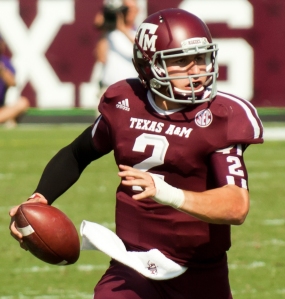The sports industry, at every level, revolves around two things: winning and money. All professional teams need both to be considered successful by today’s standards. However, at the collegiate level, the two concepts are not as related as you would think. Winning is everything, as it brings in revenue to the school, but student-athletes never get to actually see this money in terms of a paycheck.
On Monday, September 16, 2013, Mark Emmert, the president of the NCAA, spoke at a Marquette University forum and addressed the subject of paying student-athletes along with some other restructuring issues.
“One thing that sets the fundamental tone is there’s very few members and, virtually no university president, that think it’s a good idea to convert student-athletes into paid employees. Literally into professionals,” Emmert said. “Then you have something very different from collegiate athletics. One of the guiding principles (of the NCAA) has been that this is about students who play sports.”
What I found most interesting in Emmert’s statement was not so much that student-athletes won’t be paid anytime in the near future, but that they would feel like this change would make them professionals, not students. If the student-athletes in question are still carrying a full academic course-load and continue to play for their respective schools, how does that not qualify them as “student(s) who play sports?”
It’s not like people are going to choose to “play college” over “going pro” because they will now be paid for their athletic skills. Think about how unfair it is to college athletes in terms of payment – they put in so much time and effort to better themselves as individuals and as a team, yet they reap none of the monetary benefits that they generate.
Other arguments against paying student-athletes state that the richest schools will be able to attract the top players in the country, thus making smaller schools obsolete in collegiate sports. However, a post from Time argued that “competition is unbalanced because the poorest schools are not competing.”
Confused? Basically, top recruits will always flock to the most successful schools, the powerhouses of college sports – e.g., Alabama football, Duke basketball, and the like. Many top recruits are willing to sit on the bench for two full seasons before they even see actual game time. However, if schools were allowed to pay student-athletes, it would allow other “lower tier” schools to recruit top players who didn’t make the cut at these top schools. Only 5 people can be on a basketball court at the same time when you think about it.
Interestingly enough, the NCAA’s Board of Directors had previously approved allowing D1 schools to pay their athletes a $2,000 stipend. When questioned if the stipend was a form of payment, Emmert rejected the idea, saying it was to “increase the value of the scholarships.”
In the wake of numerous scandals, most recently Johnny Manziel’s autograph debacle, I think it’s time the college community seriously considered paying student-athletes for their service to the school. Granted many people are already playing on a scholarship, but the amount of time they are required to practice, in addition to keeping up with their studies, prevents many of them from working outside of school.
According to an article published on Forbes.com, for last weekend’s Alabama vs. Texas A&M football game, tickets were sold on a secondary marketplace for a whopping $763 on average. Last year, Texas A&M raised over $740 million.
When you have figures as polarizing as Johnny Manziel, how can you expect them to not want to receive some of the millions of dollars they are generating for their school? Is it really that terrible to throw some of that money in the way of the student-athletes? I’m not claiming that I approve of Johnny Manziel’s method of allegedly selling autographs for profit. However, I don’t think it’s fair to recruit student-athletes with fancy cars, house payments, free “swag,” and then not expect them to want these same things all the time in college.
Also, consider how much of a time commitment being a student-athlete really is. Most of these student-athletes don’t have time to even hold an outside job at a local restaurant or retail store. Add in the fact that all student-athletes have to travel for away games, competitions, etc., and you can understand why it would be difficult for employers to hire an individual who is out-of-town every other weekend.
Finally, as we’ve seen in the Eric LeGrand tragedy, sports careers can be derailed because of the slightest injury, so is it wrong to pay these student-athletes while they are in their prime? Most NCAA athletes don’t go on to compete at the professional level, so saying that they should wait for payment as a pro isn’t really fair either. Consider the number of potential collegiate athletes, the students who decide to quit their respective sport after high school because they aren’t sure if it’s actually worth their time and effort. If there were greater incentives, these individuals might continue to play in college. If schools aren’t willing to pay athletes, then maybe there should be a larger initiative to make collegiate sports fully funded, not just those bringing in the biggest bucks. Changes need to come to the NCAA and frankly, I hope they come sooner rather than later.
